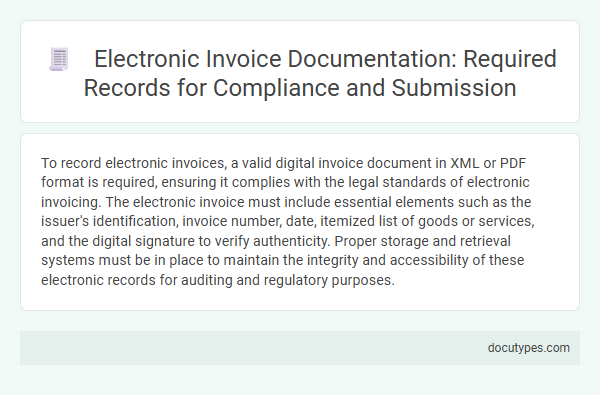To record electronic invoices, a valid digital invoice document in XML or PDF format is required, ensuring it complies with the legal standards of electronic invoicing. The electronic invoice must include essential elements such as the issuer's identification, invoice number, date, itemized list of goods or services, and the digital signature to verify authenticity. Proper storage and retrieval systems must be in place to maintain the integrity and accessibility of these electronic records for auditing and regulatory purposes.
Introduction to Electronic Invoice Documentation
Electronic invoicing streamlines business transactions by enabling digital documentation and record keeping. Proper documentation ensures legal compliance and accurate financial tracking.
- Invoice File - The core electronic invoice document containing transaction details and VAT information.
- Digital Signature - A cryptographic tool verifying the authenticity and integrity of the electronic invoice.
- Audit Trail - A detailed record showing the creation, modification, and transmission process for the e-invoice.
Key Compliance Requirements for E-Invoices
Electronic invoice recording requires a valid digital invoice document that complies with legal standards and tax regulations. Your e-invoice must include a unique identification code, timestamp, and authorized electronic signature to ensure authenticity and integrity. Maintaining compliance with these key requirements guarantees smooth processing and audit readiness.
Essential Records for Electronic Invoice Submission
Electronic invoice submission requires specific documentation to ensure accurate recording and compliance. Understanding which documents are essential helps streamline your invoicing process.
- Invoice XML File - This file contains the detailed electronic invoice data in a structured format required for processing.
- Digital Signature Certificate - Used to verify the authenticity and integrity of the submitted electronic invoice.
- Proof of Delivery or Service - Documentation confirming the goods or services were delivered or performed as invoiced.
Legal Standards Governing E-Invoice Documentation
Understanding the required documentation is essential for recording electronic invoices accurately. Legal standards ensure compliance and proper validation of your e-invoices.
- Digital Signature Compliance - Electronic invoices must include a digital signature to verify authenticity and prevent tampering.
- Structured Data Format - Legal frameworks mandate specific formats like XML or UBL to standardize invoice information for easy processing.
- Retention Requirements - Laws require storing electronic invoices securely for a defined period to guarantee future accessibility and audit readiness.
Adhering to these legal standards safeguards your invoicing process and supports regulatory compliance.
Structured Data Elements in E-Invoices
Which document is needed for recording electronic invoices with structured data elements? The essential document is the e-invoice containing standardized structured data elements, ensuring accurate and efficient processing. Your e-invoice must include key information such as supplier details, invoice number, date, item descriptions, quantities, prices, and tax information to comply with legal requirements and enable seamless digital record-keeping.
Secure Storage and Retention of Electronic Invoices
| Document Required | Purpose | Secure Storage Requirements | Retention Period |
|---|---|---|---|
| Electronic Invoice File (XML, PDF/A) | Legal proof of transaction and financial record | Must be stored in encrypted format with access controls to prevent unauthorized access and ensure data integrity | Typically 5 to 10 years, depending on local tax regulations |
| Audit Trail or Log Records | Verification of invoice creation, approval, modification, and transmission | Stored securely with restricted access and timestamp validation to ensure traceability and compliance | Aligned with invoice retention schedule, usually 5 to 10 years |
| Backup Copies | Data recovery and redundancy | Stored off-site or in secure cloud environments following the same encryption and access control standards | Maintained at least as long as the original invoice documents |
| Compliance Statements or Certificates | Proof of adherence to electronic invoicing standards and regulations | Kept accessible for audit purposes in a secure document management system | Retention spans the entire required invoice retention period |
Ensuring secure storage and proper retention of electronic invoices protects Your business from compliance risks and supports efficient financial auditing.
Digital Signatures and Authentication Protocols
Recording electronic invoices requires a valid digital signature to ensure authenticity and integrity of the document. Authentication protocols such as Public Key Infrastructure (PKI) are essential for verifying the identity of the sender and preventing fraud. These elements guarantee compliance with legal standards and enable secure electronic invoice processing.
Audit Trails and Traceability in E-Invoice Records
Recording electronic invoices requires maintaining accurate audit trails that document every transaction step. These records ensure transparency and compliance with regulatory standards.
Traceability in e-invoice records allows you to track invoice origin, modifications, and approvals throughout its lifecycle. Proper documentation supports effective financial audits and dispute resolution.
Common Pitfalls in Electronic Invoice Compliance
Accurate documentation is essential for recording electronic invoices, typically requiring the original electronic invoice file and a valid digital signature. These documents ensure the invoice's authenticity and integrity in financial records.
Common pitfalls in electronic invoice compliance include missing digital signatures, incorrect file formats, and incomplete metadata. Failure to address these issues can lead to rejected invoices or audit penalties. You must verify all required documentation before submission to prevent compliance errors.
Which Document Is Needed for Recording Electronic Invoices? Infographic

